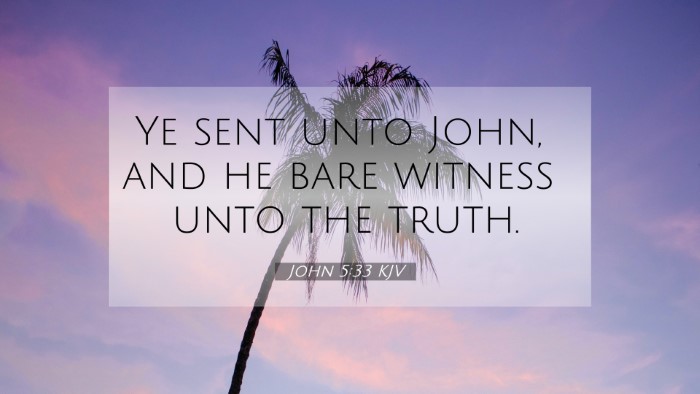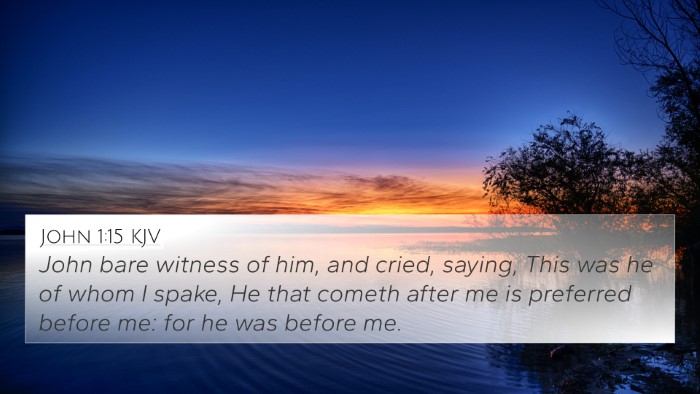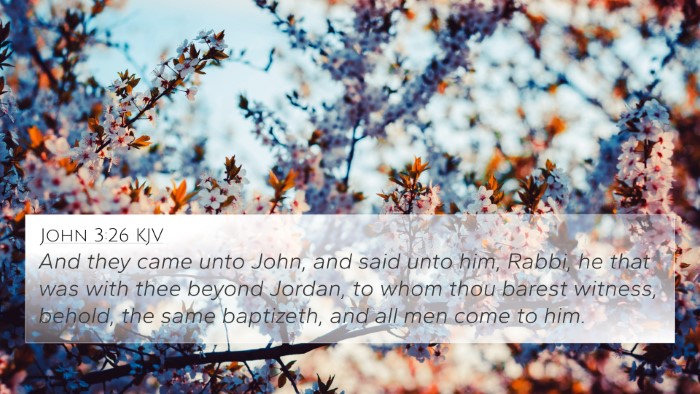Understanding John 5:33
John 5:33 states: "You sent to John, and he has borne witness to the truth." This verse highlights the role of John the Baptist in preparing the way for Jesus and affirming His identity as the Messiah. This passage can be analyzed through various commentaries to gain deeper insights.
Commentary Insights
Combining the insights from Matthew Henry, Albert Barnes, and Adam Clarke presents a comprehensive view of this verse:
Matthew Henry's Commentary
Matthew Henry emphasizes the importance of John the Baptist’s testimony as a divine witness to the truth of Christ's ministry. He describes John’s role as crucial in pointing to Jesus' character and mission. For Henry, this verse serves as a reminder of the importance of responsive faith and the acknowledgment of divine messengers in our spiritual journey.
Albert Barnes' Commentary
Albert Barnes provides a detailed examination of the phrase "bore witness to the truth," asserting that John's testimony was based on his direct experience and divine revelation regarding Jesus. Barnes highlights that John was sent by God, making his testimony authoritative and credible. The recognition of John’s witness is not merely historical, but a precursor to understanding Jesus' own claims and His divine nature.
Adam Clarke's Commentary
Adam Clarke discusses the significance of the statement regarding the sending of John. He articulates that John's role was to direct the attention of the people to Jesus, affirming that he recognized Jesus as the Lamb of God. Clarke underscores that the testimony of John fulfills the prophetic traditions, linking it to the larger narrative of God's redeeming work through scripture.
Key Themes and Connections
The themes emerging from this verse—truth, testimony, and divine mission—are pivotal in understanding the relationships between various Biblical texts. Here are some thematic connections and cross-references:
- Matthew 3:11: John's proclamation of baptism and preparation for the Messiah underscores his witness.
- John 1:6-8: John is introduced as a witness who came to testify about the Light, which establishes his role in the narrative.
- Luke 7:28: Jesus speaks of John’s greatness, affirming his prophetic stature and testimony.
- John 1:29: John identifies Jesus as the Lamb of God, a direct fulfillment of his prophetic mission.
- Isaiah 40:3: This prophecy about a voice calling in the wilderness connects John’s ministry to the Old Testament.
- Matthew 11:11: Jesus declares that among those born of women, none are greater than John, further legitimizing his testimony.
- Acts 19:4: A reference to John's baptism signifies his continued importance in the teachings of the apostles.
- John 3:30: John’s declaration that he must decrease as Jesus increases encapsulates his selflessness in witnessing to the truth.
- Revelation 19:10: The spirit of prophecy is encapsulated in the testimony of Jesus, resonating with John’s role.
- John 8:32: The truth that John bore witness to leads to freedom, reflecting a central theme of Jesus' teachings.
Importance of Cross-Referencing
Understanding John 5:33 is enriched through cross-referencing. These connections highlight a rich tapestry of scripture that informs our understanding of truth, witness, and the continuity of God’s message throughout the Bible. Tools for Bible cross-referencing can enhance personal study and sermon preparation by providing insights into thematic connections.
Tools for Bible Cross-Referencing
Utilizing a bible concordance, a bible cross-reference guide, or a cross-reference bible study can enhance one’s understanding of scripture:
- Identify connections between Old and New Testament by using comprehensive bible cross-reference materials.
- Engage in cross-referencing Bible study methods to analyze themes across different books.
- Employ a bible cross-reference system for in-depth theological study.
Conclusion
The verse John 5:33 not only underscores the critical role of John the Baptist as a witness to the truth of Jesus Christ but also invites us to engage in deeper exploration through cross-referencing related biblical texts. By understanding these connections, we enrich our spiritual insight and deepen our faith.






